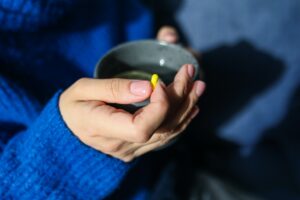Drug and Alcohol Rehab in Clacton-on-Sea
This article will discuss drug and alcohol rehab in Clacton-on-Sea. Clacton-on-Sea is in the Tendring District in Essex.
According to the latest data collected by The Office for Health and Improvement and Disparities, Essex has been found to have an estimated 12,756 adults with alcohol dependency and 2,883 adult OCUs (opiate and crack users). [1]
Other substances, such as cannabis, cocaine, and heroin, are also prominent. Alcohol is the most consumed substance, followed by cannabis.
For more information regarding drug and alcohol statistics in Essex, please follow this link.
For those based in Clacton-on-Sea who are suffering from drug and/or alcohol addiction, this article will be of use.
It will discuss what rehabs and treatments are available and what to expect.
Get all the help you need from a drug and alcohol rehab in Clacton-on-Sea by calling us today on 0800 140 4690
What is Alcohol Addiction?

Alcohol addiction, also known as Alcohol Use Disorder (AUD), is defined by three characteristics:
- The inability to control alcohol consumption
- A preoccupation with alcohol
- Drinking, regardless of negative social and health consequences
In general, AUD is a brain disorder and covers a broad spectrum ranging from mild to severe. [2]
On the mild side, AUD might refer to someone that drinks more than recommended and more times per week than average.
On the severe side, the person is likely to depend on alcohol to function properly and likely drinks throughout the day.
You can read more about the disease of addiction here.
Get all the help you need from an alcohol rehab in Clacton-on-Sea by calling us today on 0800 140 4690
The Signs of Alcohol Addiction

- Feeling cravings for alcohol.
- The inability to cut down or stop drinking alcohol.
- Daily tasks are being negatively impacted by alcohol – this could mean work, hygiene, or childcare, for example.
- Using alcohol in inappropriate situations, such as when driving.
- Developing a tolerance for alcohol and need to consume more to achieve the desired effect.
One of the most evident signs of alcohol addiction is withdrawal. This refers to an intense craving for alcohol.
Without alcohol, people will likely begin to experience alcohol withdrawal symptoms.
These can range from mild to severe and vary from person to person.
In general, however, symptoms might include nausea, headaches, shakes, and other flu-like symptoms.
This will be covered in more detail below.
Do you think you could use the help of an alcohol treatment service in Clacton-on-Sea? Then call our expert team today on 0800 140 4690
What is Rehab?

Professionally supported drug and alcohol rehab is one of the best ways to recover from addiction.
Rehab, or rehabilitation, focuses on a person’s recovery. Rehab is a broad term and can refer to a wide range of different addiction treatment services.
There is rehab for post-operation patients, ex-offenders, and those wanting to overcome some form of ailment and addiction. [3]
With regard to addiction, there are four common types of rehab in the UK:
- Inpatient rehab – people stay overnight at a facility during their treatment
- Outpatient rehab – people attend weekly appointments
- Residential treatment – this usually refers to a private rehab
- Recovery house rehab – housing that offers a recovery program as part of the tenancy
Although these rehabs vary in their location and have some unique services, most offer a similar program: detox, therapy, relapse prevention, and aftercare.
Each of these will be discussed in more detail later.
Addiction is not considered a ‘choice’ or ‘moral failing’ on behalf of the addiction sufferer – so the focus of rehab is always on returning agency to the patient.
Begin your journey towards sobriety at a first-rate rehab clinic in Clacton-on-Sea by calling our expert team on 0800 140 4690
Holding an Intervention in Clacton-on-Sea

An intervention, in simple terms, refers to the gathering of family and friends to convince their loved ones that they need to seek professional help for their substance use.
An intervention is usually the last resort and is organised when the loved one does not think they have a problem or is unwilling to admit it.
However, it is never too early to intervene on someone that is using a substance. Research has found that interventions have a high success rate in getting people to enter treatment. [4]
Unfortunately, interventions are not always easy to get right and have the potential to turn into a confrontation.
The purpose of an intervention is to encourage the loved one and show support – not to berate, shame, or guilt them into seeking help.
To make sure that your loved one gets the help they need from a rehab clinic in Clacton-on-Sea, call our team today on 0800 140 4690
How to organise a successful intervention

- Planning the intervention well – this means choosing who should be involved, where it will take place, and what is going to be said.
- Make sure you can empathise with the loved one – perhaps conduct some research about addiction and why it occurs.
- Write down what you want to say – this could be in the format of a letter.
- Practice and remember to be empathic – both in talking and when listening.
- Look at treatment options and make sure you know what is available and how it works.
Because interventions can be tricky, it is always advised to seek the help of a professional – a GP, social worker, psychologist, or psychiatrist, for example.
They will be able to either advise you or help organise/mediate the intervention.
Give your loved one the best possible chance of help through an intervention in Clacton-on-Sea – call our experts today on 0800 140 4690
The CRAFT Method of Intervention

In addition, it is worth considering something like Community Reinforcement And Family Training (CRAFT).
CRAFT was created with families in mind and focused specifically on families that are struggling to get a loved one to seek help.
Families will work alongside a professional to help organise an intervention but will also be taught some useful tools, such as positive communication, creating and maintaining boundaries, and how to stop enabling behaviours.
To learn more about CRAFT and how it can help your loved one attend addiction treatment in Clacton-on-Sea, talk to us today on 0800 140 4690
Treatment Options Available at Clacton-on-Sea

Clacton-on-Sea is home to several free drug and alcohol services. Of these, the most widely known and used is Open Road.
Open Road provides services such as:
- Detox treatment
- Therapy
- Group programs
- Harm reduction and moderation management
- Help to access other services, such as AA, NA, and SMART recovery
For help accessing free addiction treatment in Clacton-on-Sea, call our expert team today on 0800 140 4690
Can I Seek Addiction Treatment in Clacton-on-Sea through the NHS?

It is not uncommon for people to seek treatment through the NHS. However, the NHS does not have a residential facility.
Instead, what is available, is funding to help cover the cost of treatment. This is done via an application to the local council – something a GP or key worker must approve.
Unfortunately, funding is very hard to secure. The main reason for this is due to the council having a strict budget and only being able to help a certain proportion of people.
Therefore, funding has a strict criterion that people must meet. This might include things like:
- Attending local services
- Having already detoxed
- Attending a pre-rehab course
- Proving that you will maintain sobriety upon leaving rehab
Funding also has a long waiting list – usually between six months to a year.
Alternatively, there are private rehab facilities located in Clacton-on-Sea and the Essex area.
For assistance accessing NHS addiction treatment in Clacton-on-Sea, call our team today on 0800 140 4690
How Much does it Cost to Stay at Residential Rehab in Clacton-on-Sea?

These are, however, quite expensive. On the cheaper end, the average daily cost of rehab is between £300 to £400. High-end rehabs will likely charge more, ranging upwards of several thousand pounds per day.
It is worth health insurance that covers treatment costs. Although this is still expensive (usually £150 to £250 per month), it is significantly cheaper than paying for rehab outright.
For a more accurate estimation of how much your time at a drug and alcohol rehab in Clacton-on-Sea is likely to last, talk to our team today on 0800 140 4690
How Long Does Rehab Last in Clacton-on-Sea?

The recommended minimum duration of rehab, suggested by medical professionals, is 28 days.
However, most facilities will offer a range of programs – 7-day, 14-day, 28-day, and 90-day, for example.
The reason for this is that treatment needs vary from person to person, and not everyone requires a long stay at rehab.
Some factors that are often considered include:
- The substance that is being treated – heroin is likely to need more rehab than cannabis, for example.
- How long the person has been using – someone that has been using for a long time will likely have a more difficult detox and perhaps need medical supervision.
- If the person has other medical issues.
- The age, sex, and gender of the person.
It also depends on personal preference. Some people simply want to detox and not undergo therapy or relapse prevention.
Each person will be assessed before entering rehab and the duration will be suggested by a medical professional.
To get a personalised prediction of how long your time at rehab will take, call us today on 0800 140 4690
Inpatient vs Outpatient Alcohol and Drug Addiction Treatment in Clacton-on-Sea

As previously mentioned, there are several types of rehabs. However, the two most common, and therefore worth discussing in further detail, are inpatient and outpatient treatment.
Although both offer a similar program – detox, therapy and addiction counselling, relapse prevention, and aftercare – they differ in various ways.
The most obvious way that they are different is that inpatient treatment is residential and outpatient treatment is not.
This means that people that opt for inpatient treatment will be expected to stay at the facility for the duration of their treatment.
Outpatient treatment, however, is done through weekly appointments at a doctor’s surgery, clinic, or local service (usually 12 to 14 hours per week).
For help choosing between inpatient or outpatient addiction treatment in Clacton-on-Sea, give our team a call today on 0800 140 4690
Important factors to consider when thinking about outpatient treatment

The main benefit of outpatient rehab is that it can be fitted around people’s lives – whether it is work or other engagements.
However, this comes with the caveat that it tends to last a lot longer than inpatient treatment – usually six months to a year, whereas inpatient averages at about 28 days.
The main downside is that it does not remove people from their usual environments – this means that people are still surrounded by potential triggers.
Usually, outpatient treatment is best suited to those that have a less severe addiction.
Inpatient, on the other hand, is a lot more intense, and people will have 24/7 medical assistance – this makes it ideal for those with severe addiction. [6]
To discover more about outpatient alcohol and drug addiction treatment in Clacton-on-Sea, call us today on 0800 140 4690
Alcohol Rehab in Clacton-on-Sea

Upon entering treatment, after a brief medical assessment, people will begin their detox. This is the process of the body expelling harmful toxins.
It is an unpleasant but necessary part of recovery. As people begin to detox, they will also begin to experience withdrawal symptoms – these vary from substance to substance.
Alcohol withdrawal is known medically as Alcohol Withdrawal Syndrome (AWS) and ranges from mild to severe.
Mild/moderate symptoms are often flu-like – nausea, vomiting, and diarrhoea – but also include symptoms such as headaches, shakes (tremors), anxiety, restlessness, and decreased appetite.
Severe, life-threatening symptoms include seizures, breathing problems, increased heart rate, high blood pressure, disorientation, delirium, and insomnia.
Beat your addiction to alcohol with the help of an alcohol rehab in Clacton-on-Sea by calling us today on 0800 140 4690
Librium-Based Alcohol Detox in Clacton-on-Sea

Usually, people that are experiencing AWS symptoms are given a prescription drug like Librium.
Librium is a popular sedative because it has a short half-life, meaning that it is less addictive than other sedatives.
Librium helps relieve anxiety, restlessness, and decreased appetite, and helps to lessen symptoms like delirium tremens. However, it does have some negative side effects, such as drowsiness and stomach issues – bloating and diarrhoea, for example. [7]
Make sure that your alcohol detox is safe and effective with the help of an alcohol rehab centre in Clacton-on-Sea. Call us today on 0800 140 4690
Rehab for Cannabis, Cocaine, and Heroin Addiction in Clacton-on-Sea

Cannabis addiction is often are far less severe addiction than many others. Although withdrawal symptoms can be unpleasant, in most cases, people will not need any medical assistance.
Symptoms of cannabis withdrawal can include anxiety, agitation, restlessness, headaches, and a lack of appetite.
These symptoms will usually occur within several days of a person stopping their intake and can last up to 10 days, which is often the legnth of a stay at cannabis rehab.
When a person is withdrawing from cocaine addiction, they are likely to predominantly experience psychological symptoms such as paranoia, agitation, stress, anxiety, and intense cravings.
There are, however, some physical symptoms such as headaches, restlessness, and fatigue.
Cocaine and crack cocaine has one of the quickest emerging withdrawals, with some people experiencing symptoms as quickly as 30 minutes after their final dose.
These symptoms will gradually reduce over several days, but some can last up to 10 days, after which the remaining treatment period at cocaine rehab may begin.
Heroin withdrawal, like alcohol, ranges from mild to severe and can also be life-threatening.
Mild to moderate symptoms include nausea, vomiting, diarrhoea, intense cravings, sweats, anxiety, depression, muscle aches, and restlessness.
Severe symptoms include hypertension (high blood pressure), insomnia, breathing problems, and rapid heart rate.
Because heroin detox can be life-threatening, most people will withdraw gradually and will be given prescription drugs such as Suboxone, Buprenorphine, or Methadone whilst at heroin rehab. [8]
Not all substances require a drug detox. Although heroin detox is essential to recovery, neither cannabis detox nor cocaine detox are ever needed, as these substances are not physically addictive.
Whatever drug addiction you may be suffering from, get the help you need from a drug and alcohol rehab in Clacton-on-Sea by calling our expert team today on 0800 140 4690
Dual Diagnosis at Rehab in Clacton-on-Sea

Dual diagnosis (co-occurring disorder/dual pathology) refers to a person that that has been diagnosed with both mental health issues and addiction.
Dual diagnosis is common for both people that have mental health issues and suffer from addiction. The reason for this is that both interact with each other in various ways.
Studies have found that people with mental health issues – anxiety, depression, PTSD, for example – are at a higher risk of developing an addiction.
It is not uncommon for people to self-medicate using a substance such as alcohol or cannabis. However, prolonged use of such substances will lead to addiction.
Conversely, studies have found that substances such as alcohol, cannabis, cocaine, and heroin all increase the chances of people developing mental health issues, such as anxiety or depression. [9]
To learn more about how an alcohol and drug rehab in Clacton-on-Sea will work to support your mental health, call our team on 0800 140 4690
What Therapy Will I Receive at Rehab in Clacton-on-Sea?

A key part of any treatment program is therapy.
Many different styles of addiction therapies exist, each one offering a different approach to healing from addiction.
Common examples of therapy at rehab in Clacton-on-Sea include:
- Individual Therapy
- Cognitive Behavioural Therapy (CBT)
- Dialectical Behavioural Therapy (DBT)
- Motivational Interviewing (MI)
- Motivational Enhancement Therapy (MET)
- Brief Intervention
- Holistic Therapy (Art therapy, music therapy, meditation, mindfulness, yoga, acupuncture, nutritional counselling, etc.)
- Group Therapy
To experience any and all of these excellent therapies for yourself at a rehab in Clacton-on-Sea, contact our team today on 0800 140 4690
One-to-One Therapy

One-to-one therapy focuses on talking. People will sit with a trained professional and talk about their addiction. The goal is to uncover what reason led to the addiction and why the substance is being used.
This might involves discussing past trauma, childhood experiences, or relationships.
Cognitive Behavioural Therapy

CBT focuses on the relationship between thoughts and actions (cognition and behaviour). It is believed by professionals that before a person behaves in a certain way, there are cognitive processes at work – either positive or negative.
Positive thoughts lead to positive behaviour, and negative thoughts lead to negative behaviour.
Therefore, teaching people to think positively should help them overcome substance use and maintain sobriety.
Motivational Interviewing

MI focuses on a person’s motivations – both good and bad – and seeks to understand them better.
Then, people will be encouraged to rethink and develop their motivations into positive ones, such as being motivated to remain sober.
Holistic and Alternative Therapies

Holistic therapy is about developing well-being, both physical and mental.
This is done through activities such as meditation, yoga, painting, or gardening, for example.
Group Therapy

Finally, probably the most common therapy in rehab is group therapy. This is a therapy that encourages people to engage with peers – others that are going through a similar experience.
This helps alleviate feelings of isolation and provides people with accountability. [10]
Find the help you need to overcome addiction at a rehab in Clacton-on-Sea – call our admissions team today on 0800 140 4690
Relapse Prevention and Aftercare in Clacton-on-Sea

Following therapy, people will begin developing a relapse prevention plan. The goal of this is to help people maintain sobriety when leaving rehab.
Experts have agreed that abstinence is far more effective than harm reduction or moderation management – as a result, that’s what rehabs focus on.
Developing a relapse prevention plan involves people thinking about and then writing down what they think might tempt them to use a substance again.
For example, this might include a list of potential triggers – people, environments, social activities, or work.
People will also be taught useful tools that can be implemented should temptation occur – how to change negative thoughts, control and deal with negative emotions, and communicate and connect with people who can help.
As part of the latter, people are provided with aftercare following rehab. This means that people will receive continued support, such as weekly check-ins, continued therapy, and help to access local services.
In addition to Open Road, Essex is also home to Alcoholics Anonymous (AA), Narcotics Anonymous (NA), and SMART Recovery. [11]
Beat addiction once and for all with the help of a drug and alcohol rehab centre in Clacton-on-Sea by calling our team today on 0800 140 4690
Contacting Rehab Recovery
For more information on detox and rehab centres in Clacton-on-Sea, contact Rehab Recovery today on 0800 088 66 86.
When you contact us, we shall outline a variety of rehab clinics and treatment options that are available to you in Clacton-on-Sea. This includes both private and statutory addiction treatments.
We also offer our rehab services across a variety of locations within the UK, including Merseyside, Lancashire, Yorkshire, Scotland, Wales, Newcastle and more!
References
[2] Witkiewitz, K., R. Z. Litten, and L. Leggio. “Advances in the science and treatment of alcohol use disorder.” Science advances 5, no. 9 (2019): eaax4043. Accessible here: https://pubmed.ncbi.nlm.nih.gov/31579824/
[3] Paul, Howard A. “The Complete Family Guide to Addiction: Everything You Need to Know Now to Help Your Loved One and Your Self: Harrison, TF, & Connery, HS (2019). New York, NY: Guilford Press, vii+ 262 pp., $16.95 (paperback).” (2020): 53-59. Accessible here: https://www.tandfonline.com/doi/abs/10.1080/00168890.2019.1690095
[4] Ibid. Accessible here: https://www.tandfonline.com/doi/abs/10.1080/00168890.2019.1690095
[5] https://www.openroad.org.uk/
[6] Kaye, Alan David, Nalini Vadivelu, and Richard D. Urman, eds. Substance abuse: Inpatient and outpatient management for every clinician. Springer, 2014. Accessible here: https://link.springer.com/book/10.1007/978-1-4939-1951-2?noAccess=true
[7] Bayard, Max, Jonah Mcintyre, Keith Hill, and Jack Woodside. “Alcohol withdrawal syndrome.” American family physician 69, no. 6 (2004): 1443-1450. Accessible here: https://www.aafp.org/pubs/afp/issues/2004/0315/p1443.html
[8] West, Robert, and Michael Gossop. “Overview: a comparison of withdrawal symptoms from different drug classes.” Addiction 89, no. 11 (1994): 1483-1489. Accessible here: https://onlinelibrary.wiley.com/doi/epdf/10.1111/j.1360-0443.1994.tb03729.x
[9] Tiet, Quyen Q., and Brent Mausbach. “Treatments for patients with dual diagnosis: a review.” Alcoholism: Clinical and Experimental Research 31, no. 4 (2007): 513-536. Accessible here: https://pubmed.ncbi.nlm.nih.gov/17374031/
[10] Miller, William R., Carolina E. Yahne, and J. Scott Tonigan. “Motivational interviewing in drug abuse services: a randomised trial.” Journal of consulting and clinical psychology 71, no. 4 (2003): 754. Accessible here: https://pubmed.ncbi.nlm.nih.gov/12924680/
[11] Brandon, Thomas H., Jennifer Irvin Vidrine, and Erika B. Litvin. “Relapse and relapse prevention.” Annu. Rev. Clin. Psychol. 3 (2007): 257-284. Accessible here: https://pubmed.ncbi.nlm.nih.gov/17716056/


